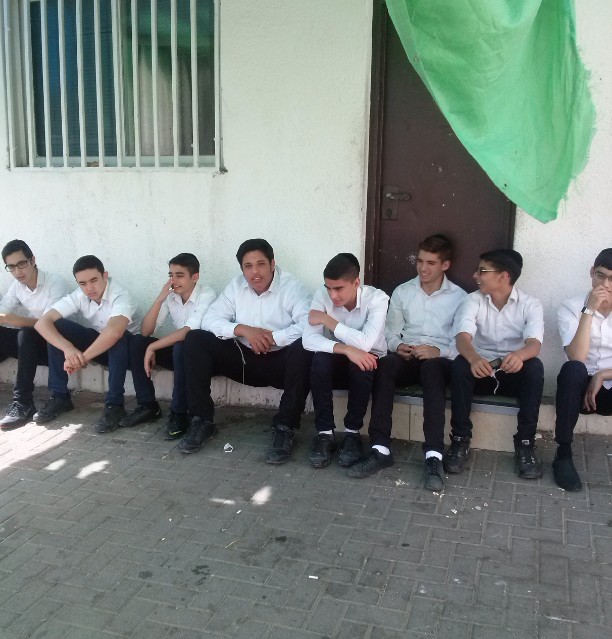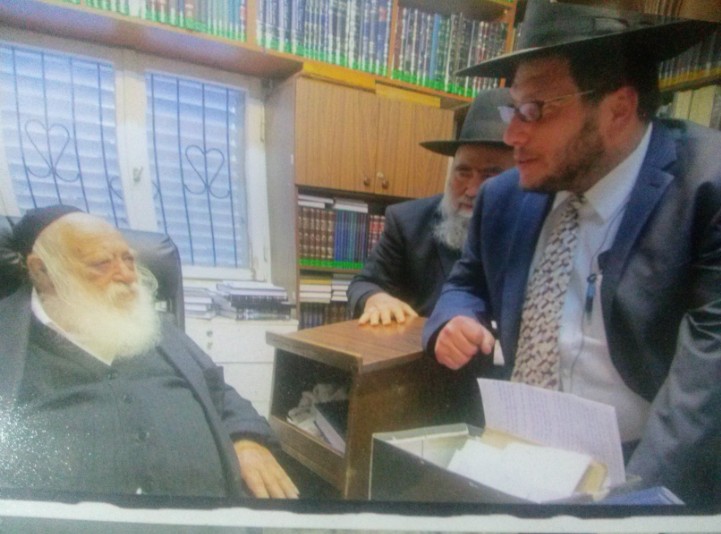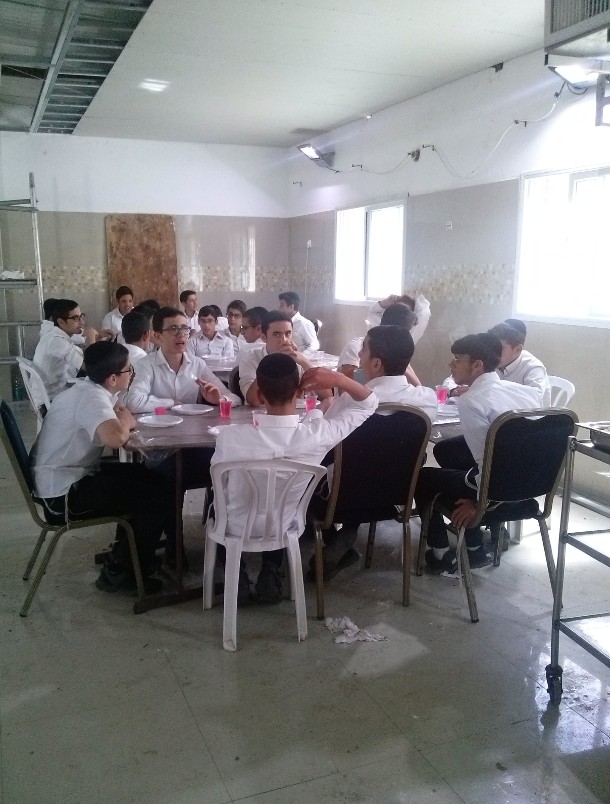Rabbi Kaufman of Knesset HaTorah Yeshiva: "It's Easier to Save a Boy Before He Falls, Than After He Drops Out"
Rabbi Ephraim Kaufman has researched the dropout issue in the Haredi sector and developed a method that helps young boys get on the right track. He established the 'Knesset HaTorah' Yeshiva, which attracts boys who have failed and now rebuild their confidence. The emotional stories from within the yeshiva's walls prove that you must never despair.

"For half a year my son sat at home," says R' Avraham, father of 16-year-old Menachem, his voice cracking with pain visible in his eyes. "Menachem always suffered from mild hearing problems that delayed his learning, and he was always a bit behind the other kids in class. In Talmud Torah, it wasn't very noticeable, but when he started in a small yeshiva, the gap widened and he couldn't cope. At some point, Menachem decided he didn't want to continue at the yeshiva he attended. We tried to enroll him in various yeshivas, but all said they only accept boys his age who are entering the first level."
For a father who holds a high-ranking position in one of the well-known yeshivas in the country, it's hard to talk about it. "It was a slap in the face for us," he admits, "We have four boys at home, all talented, learning well, but only with the fifth son did we face a challenge; we didn’t know what to do."
Then, as he points out, one of his sons-in-law heard about the 'Knesset HaTorah' yeshiva in Petah Tikva and recommended sending the child there. "Menachem began studying at the yeshiva and suddenly he became a different boy," the father recounts, "He didn't even find time to call us during the first week, and on Friday, he came home beaming. We experienced an uplifting Shabbat, unlike anything we've had for the past six months, and on Saturday night, Menachem rushed to pack his things and go back to the yeshiva. We got our child back," he says emotionally.
Falling into Despair
What is it about Knesset HaTorah yeshiva that cases like Menachem's gather there from all over the country? Truth is, from the outside, it looks like a classic Haredi yeshiva. The boys dressed as yeshiva students, devoted to their studies in the study hall. However, when you delve deeper, there's something different about the yeshiva's approach. Revolutionary, one might say.
"We operate from the understanding that it's always easier to prevent dropout among youth before it happens, rather than address it after deterioration," explains Rabbi Ephraim Kaufman, head of the yeshiva. "I personally have extensive experience dealing with dropout youth, and what I have identified is that for most of those who dropped out, the signs weren’t initially clear. Although there are cases where children began to struggle with educational issues as early as third or fourth grade, these are the minority. In most cases, by eighth grade, the children functioned properly and studied well. The fall started when they left Talmud Torah and entered a small yeshiva. That was the hardest stage for them."
 Waiting outside Rabbi Ephraim's office, there's a queue for conversation and encouragement
Waiting outside Rabbi Ephraim's office, there's a queue for conversation and encouragementWhy?
"One must understand that an eighth-grade child usually finishes learning around 4:30 PM. Then, he does homework, rides his bicycle, plays on the computer, and generally has enough time to unwind and relax. However, when these kids go to yeshiva, many get a real shock because suddenly they have to study every day, non-stop, until 9 PM, and study is studying, not like in a classroom with breaks. True, some of them become serious and excel because of it, but there are also boys who don't know how to handle it."
Rabbi Kaufman emphasizes, "It's not that the students who fail don't want to learn or, heaven forbid, don't love the Torah. These are excellent and capable boys, but they’re entering a world unfamiliar to them. Initially, they try to integrate into their studies but fail again and again, and then they fall into the arms of despair. Despair is very dangerous because it has no rules, and you can do whatever you want. At this point, we see frightening and shocking things when within a week or two, the boys change, and the work they did in Talmud Torah for eight or ten years almost goes to waste."
Finding Solutions
The solution found by the 'Knesset HaTorah' yeshiva is to create a suitable platform for these boys. "We don't aim to make it a summer camp for them, but it is important to us that they become serious Torah students," Rabbi Kaufman explains, "Therefore, our method is based on the approach of 'Educate a child according to his way', and we offer study hours in a dosage almost identical to that of Talmud Torahs, not yeshivas."
Although it sounds simple, it turns out it requires significant effort from the staff because many of the boys who reached Knesset HaTorah came after being expelled from other yeshivas, broken and crushed. To make them love learning again, a foundational change is needed. "To achieve this, we transformed our yeshiva's learning schedule to one accompanied by additional activities that help the kids relieve their pressure. We have basketball and soccer fields in the yeshiva where the boys can play, a computer room open during certain breaks, and a game room with board games. Throughout the day, serious in-depth and knowledgeable lessons are held, but in between, the boys have ways to unwind."
The entire yeshiva is designed like a full boarding school, and Rabbi Kaufman emphasizes that this is the guiding principle. "In most small yeshivas, the boys return home on Thursday evenings, knowing they have all night, Friday morning, and Saturday night ahead of them. For our boys, this could be destructive, as a child returning home with nothing to do might find himself wandering the streets. Therefore, in our yeshiva, there is a boarding structure until Friday morning, and on Thursday nights, the staff ensures a light educational activity with a barbeque and a good meal.
"There are no yeshiva Shabbats with us," he stresses, "and on Saturday night the boys are required to return here again. It's not easy for them, and sometimes it's hard for the parents too, but eventually, everyone admits that it's beneficial."
Bridging Gaps
Knesset HaTorah yeshiva has been running for seven years, yet when Rabbi Kaufman is asked who should enroll there, he finds it hard to answer. "That's the million-dollar question," he says, "because until a year ago, we barely accepted students who finished Talmud Torah; we recommended parents send them to regular yeshivas, and if they fall, they'll come to us. But this past year, quite a few came directly to us because their parents feared they might try other things."
And what do you recommend?
"Obviously, if a boy can manage and study in a regular yeshiva, it's preferable he does so, and that is my recommendation even for those who are unsure but still think there’s a chance. However, there are children for whom it's clear from the start it will be difficult. I believe every parent knows his child's spirit and can estimate how he will cope. Teachers and principals can also help with the decision, and sometimes the seventh-grade teacher can provide the most accurate opinion since yeshiva registration happens at the start of eighth grade, and the new teacher may not always know the children deeply."
 Rabbi Ephraim Kaufman with the Gaon Rabbi Chaim Kanievsky Shlita
Rabbi Ephraim Kaufman with the Gaon Rabbi Chaim Kanievsky ShlitaRabbi Kaufman adds that over the years the boys study in 'Knesset HaTorah', many of them transition to regular yeshivas after bridging gaps, and they seem capable of managing.
"One of our distinguished students progressed unbelievably, and when we felt he had completed the process, we advised him to transfer to Rabbi Laizerowitz's small yeshiva in Rehovot, where he studied in the third level and later continued to Maor HaTalmud yeshiva. Today, he is one of the leading students there," he says with satisfaction.
A Sense of Victory
It is common to claim today that dropout occurs due to a lack of warmth and love, but Rabbi Kaufman completely disagrees. "I sometimes encounter boys who experienced too much warmth and love in childhood, leading to a lack of boundaries because they were constantly given up and never demanded anything from themselves. In our yeshiva, on the other hand, we certainly demand from the students. We repeatedly show them what they can achieve and expect them to prove themselves. This helps them regain the self-esteem and confidence they so sorely lacked."
Eliyahu is an example of a boy who succeeded precisely because of this method to rebuild himself. "I first studied at a yeshiva in Bnei Brak," he recounts his journey, "I was expelled from there, then I went to a yeshiva in Ramat Gan, there was pressure and a high level of learning, I didn’t manage and was 'thrown out' again, then I came to 'Knesset HaTorah' yeshiva."
 Knowledge-building meal
Knowledge-building mealAfter repeated blows to his confidence, Eliyahu managed to connect in a special way to the new yeshiva. "Suddenly I felt the staff thought about me and that I mattered to them. I remember the summer vacation, about three months after I entered the yeshiva. We went to a camp, and exactly then my grandmother passed away. The entire staff, without exception, mobilized to help me reach the funeral quickly. I felt like I was their son."
That sense of belonging was also felt by Eliyahu when one of the rabbis approached him one day and casually suggested he go out with him to a small spring in the area. Thus, they went out, him and some other boys, together with the staff member, just like that, in the middle of the routine, to refresh and relax.
Eliyahu notes that at the end of the current year, after two and a half years since joining the yeshiva, he applied to enroll in three large yeshivas, and was accepted into all. Now he just has to choose the one he wants.
How do you feel about the fact that just two years ago you were expelled from all the yeshivas, and now you're the one choosing where to go?
He thinks for a moment, then replies in a choked voice: "I feel like I've won."
Rabbi Kaufman's phone number - 050-6581738

